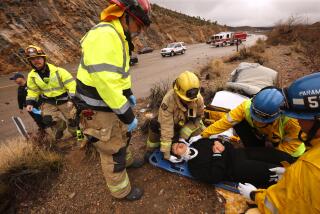Helping Hands : Good Samaritans Are an Endangered Species but Not an Extinct One
EVIDENCE THAT the Good Samaritan still exists keeps coming in from readers who have met one. My colleague DeWayne B. (Doc) Johnson recalls an experience he had one hot summer day on a bleak stretch of the San Joaquin Valley while traveling with his family.
I lived for a time in Bakersfield as a boy, and I know too well the hazards of that valley. The intrepid motorists setting out across its arid reaches had to deal with blown tires, overheated engines and steaming radiators. Going over the Ridge Route to Los Angeles, which was then a grueling and dangerous five-hour drive over a sinuous two-lane highway, was an adventure that left the traveler limp with exhaustion
Johnson’s ordeal occurred in modern times, when tires and engines were not as susceptible to heat, but it was complicated by the fact that Interstate 5, which now runs the length of the valley, was then still under construction. Its completed southern end reached only to a point southwest of Buttonwillow. The Johnsons had to drive north on Highway 99 and detour westward on State Highway 119, known to locals as Taft Highway, to pick up the new road.
“The traffic was single-file and agonizingly slow. A few miles west of Greenfield we were engulfed in a cloud of steam; thanks to remarkable luck and skilled navigating we arrived at the intersection that constituted the core, then and now, of Pumpkin Center.” Pumpkin Center is west of Weed Patch. Neither is a place where one would care to be stranded, though a good many people call them home.
Johnson describes that corner as having been like a scene from Steinbeck. The only amenity was a place called Eats, with four tables covered by checkered oilcloths, a grimy counter with salt, pepper and sugar dispensers, and a limited menu whose best bet was hamburgers on dried-out buns.
Most of us have known the desolation of being stranded at such a crossroads. A place called Eats is an oasis, and a gas station with a working washroom is heaven.
What the Johnsons found instead was a gas station “awhirl in a blinding dust devil, its paint chipping, its attendant uninterested in life. Who could blame him? It had little to offer the traveler except one kind of gasoline, a can of oil, a trickle of water from the hose and nothing more.”
Johnson knew, of course, that his radiator had boiled over and was probably clogged with rust and crud. The attendant told him: “We ain’t got no mechanic, but the guy at the fruit stand sometimes works on cars.”
An auto-supply store across the way catered mostly to farmers, and in any case it was closed. Resigned, Johnson called on the man at the open-air fruit and vegetable stand. Here Johnson encountered his remarkable Samaritan.
The man confirmed the diagnosis and said the radiator would have to be taken into Bakersfield to be boiled out--a three- or four-day operation. But the Johnsons were eager to get their daughter to Oakland Airport for a flight to an important college musical event. They couldn’t wait four days.
At the back of the fruit stand stood the man’s truck--a flatbed of uncertain vintage. It was the fruit man’s sole means of transportation and also served his family.
With his wife and his children’s approval, he said he would lend the Johnsons his truck’s recently repaired radiator, and they could travel on; meanwhile he would send Johnson’s radiator to Bakersfield for repairs. In three or four days Johnson could come back and swap radiators again.
“And that is what he did and what we did, and he insisted on accepting payment only for what it cost him to have our radiator tended to in Bakersfield. Nothing else--absolutely nothing else. I have forgotten his name, but you may be assured that it is written in golden letters in our memories and no doubt in heaven.”
Such stories do lead us to believe that people really are pretty darn good; or at least some people are.
Odd, though, that these Samaritans always seem to turn up by the wayside, in the most hostile places, when one is most desperate and isolated from one’s usual support system.
Well, that’s what Samaritans do, isn’t it?
More to Read
Sign up for Essential California
The most important California stories and recommendations in your inbox every morning.
You may occasionally receive promotional content from the Los Angeles Times.









